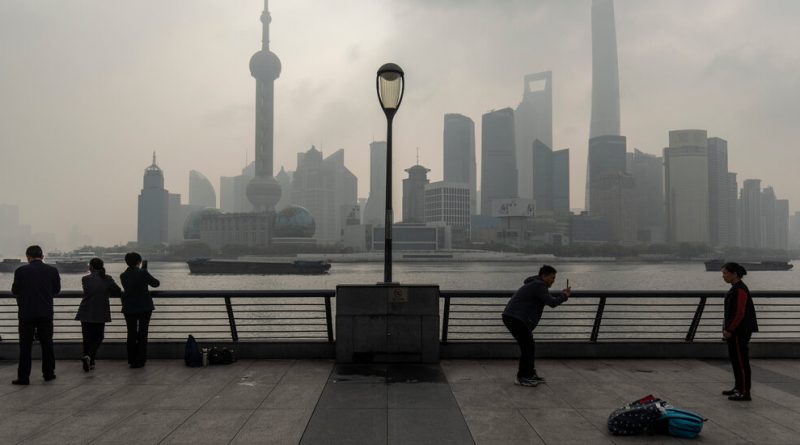U.S. Consulting Firm Is the Latest Target of a Chinese Crackdown
In the latest official scrutiny of a prominent American business in China, the authorities visited the Shanghai offices of the U.S. management consulting firm Bain & Company this month to question its employees.
In a written statement, Bain said it is “cooperating as appropriate with the Chinese authorities,” but declined to comment on the nature of the investigation and whether its employees’ phones and computers had been seized during the visit.
The questioning at Bain came less than a month after the authorities detained five Chinese nationals working in Beijing for the Mintz Group, an American consulting company with 18 offices around the world, and closed the branch. The five Chinese nationals were held overnight before their families were notified that they had been detained. China’s foreign ministry later said that the company was suspected of engaging in unlawful business operations.
Mintz had no immediate response on Thursday to a request for comment on whether any of its five employees had been released.
Companies that buy or invest in a factory or another company typically hire a business like Mintz to do what is known as a due diligence review, checking to make sure there are no hidden problems involving the target company. Bain, by contrast, provides corporate advice: Companies share details of their sales, operations and long-term plans with Bain to obtain an independent perspective on how they can improve.
The raid on Bain’s operations in Shanghai is the latest sign of the strained economic relationship between the U.S. and China. Beijing is especially upset about restrictions imposed by the Biden administration preventing the sale of critical semiconductor-making equipment to China. Without critical chip-making tools, China’s semiconductor industry, already considered a technological laggard, will struggle to close the gap on leading firms and gain access to cutting-edge technologies used in everything from military equipment to consumer electronics.
Beijing is also unhappy that U.S. law enforcement authorities have arrested two men in New York City, accusing them of helping to run an unauthorized Chinese police outpost to intimidate and control Chinese citizens. American prosecutors also filed charges against 42 Chinese police officers and other officials, accusing them of various actions against dissidents in the United States. The Ministry of Public Security accused U.S. prosecutors on Wednesday of having “maliciously concocted” and “completely fabricated” the charges.
“If the U.S. continues to go its own way, China will resolutely counter it to the end,” the ministry said.
Treasury Secretary Janet L. Yellen called for a constructive and healthy economic relationship between the two countries in an address last week that seemed aimed at lowering the temperature in the trans-Pacific relationship. She specifically said the U.S. does not need to “decouple” its economy from China and that Chinese growth does not have to come at the expense of U.S. economic leadership.
The U.S. Embassy in Beijing and the American Chamber of Commerce in Shanghai declined to comment on the questioning of Bain employees.
China’s targeting of advisory firms comes as the country’s top legislative body approved a revised espionage law that broadens the list of activities that would constitute spying. The amended counterespionage law, passed on Wednesday, has alarmed foreign businesses because normal business activities could expose executives and employees at foreign firms to be marked as a spy.
It is a common business practice for companies to investigate local markets and do background research on potential partners or competitors before investing money. They often rely on advisory firms like Mintz and Bain to help with that work.
China’s scrutiny of prominent U.S. firms is sending a mixed message after China’s economic policymakers had pushed last month for more foreign investment. The foreign business community has grown concerned that the economic pragmatism that helped to build the world’s second-largest economy has taken a back seat to the ideological and national security priorities of the Chinese Communist Party and its leader, Xi Jinping.
Foreign companies were especially thrown by China’s draconian “zero-Covid” policies over the past three years that frequently disrupted businesses, brought economic growth nearly to a halt, and prevented overseas executives from visiting employees and operations in the country.
Li Qiang, China’s premier, told a forum of foreign business leaders last month that the country strives to create a business environment “that is market oriented, ruled by law and internationalized.” It will continue to open up the economy, he said, “no matter how the international situation changes,” according to state-owned CCTV News.
It is not clear whether Beijing is targeting the actual consulting firms or the prominent clients that they advise in China’s hard-to-navigate business environment.
The Financial Times reported earlier, citing people familiar with the situation, that Chinese police had raided Bain’s offices on multiple occasions, removing computers and phones but not detaining employees.
Police raids in China on American advisory firms raise difficult legal dilemmas for the firms. The Chinese government sometimes imposes gag orders in connection with raids.
Multinationals typically share sensitive information with advisory firms under confidentiality agreements that require the clients to be notified if any of their data is compromised. So firms that are raided face conflicting legal obligations to the Chinese government and to their clients.
Many global companies operating in China are trying to wall off their computer systems outside of China to limit potential losses of trade secrets and other valuable data.
Claire Fu contributed research.
Source: Read Full Article



